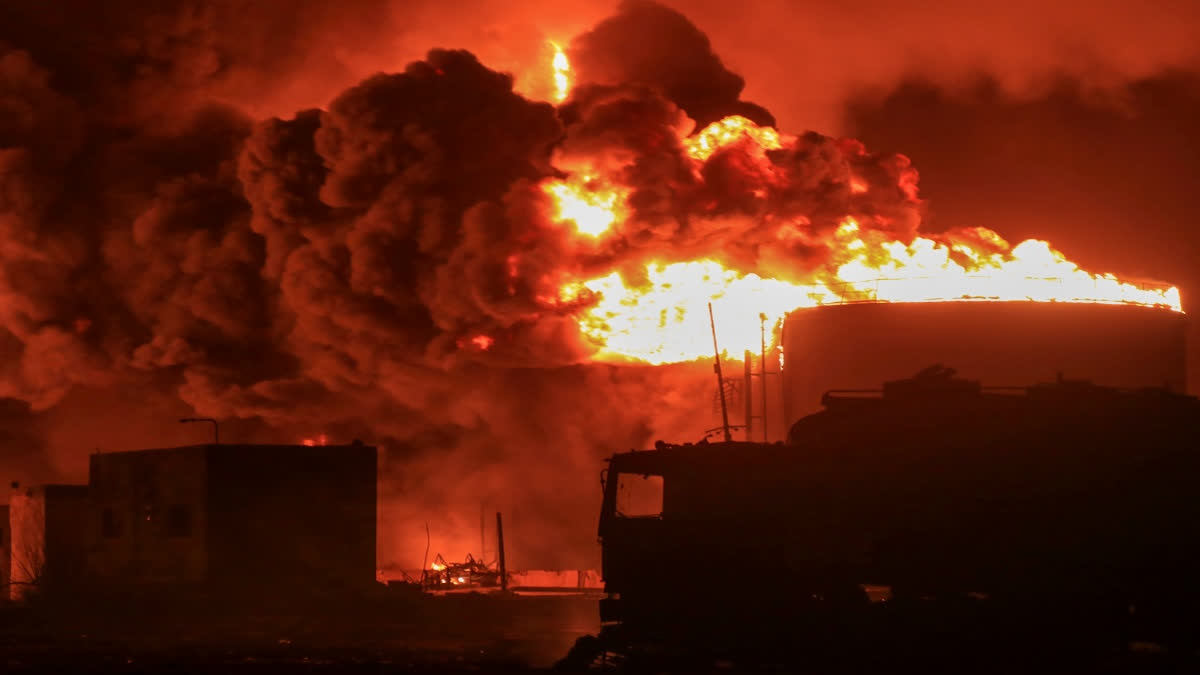Beirut/ Sanaa: The Israeli army said on Saturday it has struck several Houthi targets in western Yemen following a fatal drone attack by the rebel group in Tel Aviv the previous day.
The Israeli strikes appeared to be the first on Yemeni soil since the Israel-Hamas war began in October, and they threatened to open a new front in the region as Israel battles proxies of Iran.
A number of “military targets” were hit in the western port city of Hodeidah, a Houthi stronghold, the Israeli army said, adding that its attack was in response to “hundreds of attacks” against Israel in recent months.
“The Houthis attacked us over 200 times. The first time that they harmed an Israeli citizen, we struck them. And we will do this in any place where it may be required,” Israeli Defense Minister Yoav Gallant said in a statement.
The Ministry of Health in Sanaa said that 80 people were wounded in a preliminary toll of the strikes in Hodeidah, most of them with severe burns.
“Israel's necessary and proportionate strikes were carried out in order to stop and repell the Houthi's terror attacks after 9 months of continuous aerial attacks toward Israeli territory.”
— Israel Defense Forces (@IDF) July 20, 2024
Hear from IDF Spokesperson RAdm. Daniel Hagari on Israel’s response to the Houthi… pic.twitter.com/VEocconfhJ
Earlier, Lebanon's militant Hezbollah group said that its fighters fired dozens of rockets into northern Israel on Saturday, targeting a kibbutz for the first time in nine months in retaliation for an Israeli drone strike earlier in the day that wounded several people including children.
Also Saturday, the militant Palestinian group Hamas said it fired rockets from Lebanon toward an Israeli army post in the northern Israeli village of Shomera in retaliation for the Zionists massacres in the Gaza Strip. Hamas has carried out such attacks form Lebanon over the past several months, but they have been rare.
On Saturday night, an Israeli airstrike on the southern coastal village of Adloun hit an arms depot and it was followed by a series of explosions that hit nearby villages with shrapnel, said state-run National News Agency, or NNA. The agency said that three people were slightly wounded in the nearby village of Kharayeb and hospitalized.
The agency didn't give further details about the arms depot, but it was believed to belong to Hezbollah, which has a wide presence in the area. The explosions lasted more than an hour after the airstrike, NNA said.
Hezbollah's attack earlier in the day with dozens of Katyusha rockets on the northern Israeli kibbutz of Dafna came few hours after an Israeli drone strike hit a car in the southern Lebanese village of Burj al-Muluk, and shrapnel from the missile wounded several people who were standing nearby. NNA said that the wounded civilians are Syrian citizens and they included children.
The Israeli military said that about 45 projectiles were detected crossing from Lebanon into northern Israel in three separate barrages. It said that some were intercepted, while others fell in open areas, causing no injuries, but triggering several fires in the Golan Heights.
On Friday, Hezbollah said that it fired rockets at three villages in northern Israel for the first time in retaliation for a strike that killed several people the night before.
Hezbollah began firing rockets shortly after Hamas' Oct. 7 attack on southern Israel, saying it aimed to ease pressure on Gaza. The exchange of fire and airstrikes, which has been limited to a few kilometers or miles on each side of the border, has displaced tens of thousands of people in both countries.
On Wednesday, Hezbollah leader Hassan Nasrallah warned that his group would retaliate against Israeli strikes in Lebanon that inflict civilian casualties by firing rockets and targeting new villages that were not targeted in the past.
Since early October, Israeli airstrikes in Lebanon have killed more than 450 people, mostly Hezbollah members, but also around 90 civilians and non-combatants. On the Israeli side, 21 soldiers and 13 civilians have been killed.
Deadly strikes inside Gaza
Also Saturday, at least 13 people were killed in three Israeli airstrikes that hit refugee camps in central Gaza overnight, according to Palestinian health officials, as cease-fire talks in Cairo appeared to make progress.
Among the dead in the Nuseirat and Bureij refugee camps were three children and one woman, according to Palestinian ambulance teams that transported the bodies to nearby Al-Aqsa Martyrs Hospital. Associated Press journalists counted the 13 corpses.
Earlier, a medical team delivered a live baby from a Palestinian woman killed in an airstrike that hit her home in Nuseirat on Thursday. Ola al-Kurd, 25, was rushed by emergency workers to Al-Awda Hospital in northern Gaza in the hope of saving the unborn child. Hours later, doctors told the AP that a baby boy had been delivered.
The still-unnamed newborn is stable, but has suffered from a shortage of oxygen and has been placed in an incubator, Dr. Khalil Dajran said on Friday.
Al-Kurd’s “husband and a relative survived yesterday’s strike, while everyone else died,” Majid al-Kurd, the deceased woman’s cousin, told the AP on Saturday. “The baby is in good health based on what doctors said.”
The war in Gaza, which was sparked by Hamas’ Oct. 7 attack on southern Israel, has killed more than 38,900 people, according to the territory’s Health Ministry, which doesn’t distinguish between combatants and civilians in its count. The war has created a humanitarian catastrophe in the coastal Palestinian territory, displaced most of its 2.3 million population and triggered widespread hunger.
Hamas’ attack in October killed 1,200 people in Israel, mostly civilians, and militants took about 250 hostage. About 120 remain in captivity, with about a third of them believed to be dead, according to Israeli authorities.
Unrest in the West Bank
In the occupied West Bank, the Palestinian Health Ministry said a 20-year-old man was shot dead by Israeli forces late Friday. Commenting on the shooting, the Israeli army said its forces opened fire on a group of Palestinians hurling rocks at Israeli troops in the town of Beit Ummar.
A witness said that Ibrahim Zaqeq wasn’t directly involved in the clashes and was standing nearby. Zaqeq “just looked at them, they shot him in the head,” Thare Abu Hashem said.
On Saturday, Hamas identified Zaqeq as one of its members. Violence has surged in the territory since the war in Gaza began. At least 577 Palestinians in the West Bank have been killed by Israeli fire since then, according to the Ramallah-based Health Ministry, which tracks Palestinian deaths.
In Cairo, international mediators, including the United States, are continuing to push Israel and Hamas toward a phased deal that would halt the fighting and free about 120 hostages in Gaza.
On Friday, U.S. Secretary of State Antony Blinken said a cease-fire deal between Hamas and Israel that would release Israeli hostages captive by the group in Gaza is “inside the 10-yard line,” but added “we know that anything in the last 10 yards are the hardest.”



